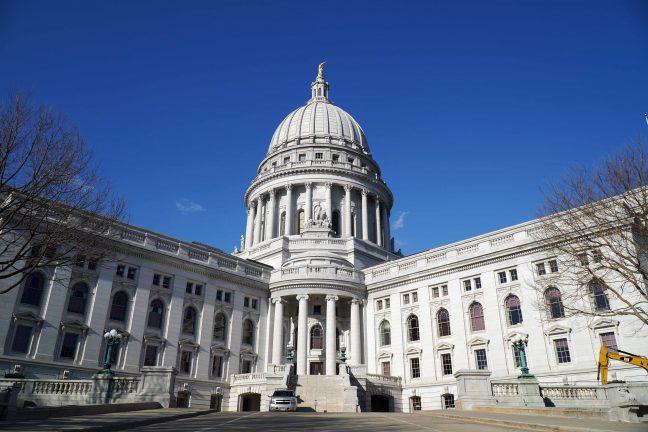As Wisconsin’s COVID-19 cases continue to rise, federal data from the U.S. Department of Health & Human Services show that a multitude of the state’s hospitals have been under “extreme stress.” This data is based on the collection of COVID-19 patients at individual hospitals, with the Wisconsin Hospital Association reporting hospitalizations from as early as April.
Defined by the University of Washington’s Institute for Health Metrics and Evaluation, having over 20% of beds occupied by COVID-19 patients constitutes “extreme stress” for a hospital. “High stress,” on the other hand, represents 10% to 19%.
Dec. 9 data showed that of the 1,535 inpatients reported, 43 of the 83 hospitals with COVID-19 inpatients had levels that would have placed them under “extreme stress.” Out of those hospitals, all but three were under “high stress.”
In a Post Crescent article, chief nursing officer of Green Bay’s HSHS hospitals Ken Nelson discussed the statewide increase in COVID-19 cases.
“We’ve been at this for so long now,” Nelson said. “We’ve been asking people for months and months to take extra shifts, come in on their days off, stay extra hours after their shifts. It’s been stressful … a lot of time and stress.”
With federal data showing a concerning level of cases and overrun hospitals, Wisconsin residents might wonder why nothing has been done.
The answer can be found simply within the tense relationship between Gov. Tony Evers and Wisconsin’s Republican majority legislature.
Sadly, this relationship has caused inaction with regard to COVID-19 relief and safety plans. While Evers continues to try and implement different relief plans and safety strategies — including mandatory mask mandates and lowered capacity of businesses — he faces obstacle after obstacle from the legislature.
Dec. 3, Evers asked the federal government to prioritize both Wisconsin’s health care workers and at-risk residents when the COVID-19 vaccine is deployed, briefly blaming the surging cases on the state legislature’s inaction.
In his letter to the U.S. Department of Health and Human Services Secretary Alex Azar, Evers said that several of his efforts — specifically his stay-at-home order — to stop the spread and rise in cases have faced unrelenting legal challenges, stating that, “Wisconsin uniquely faces substantial barriers to implementing statewide mitigation strategies.”
“Given this and the outsized impact COVID-19 is having on our state, it is critical that Wisconsin be prioritized for vaccine allocation in quantities sufficient to vaccinate our healthcare workforce and with additional doses to be able to distribute to high-risk populations,” Evers said.
Founder and editor of the moderate conservative news website The Bulwark Charlie Sykes discussed the divide within the Wisconsin legislature and government, stating, “had [Robin Vos and Scott Fitzgerald] wanted to get something done, they easily could have … they’ve allowed their toxic relationship with the governor to get in the way of legislating.”
Sykes attributes the inaction of Wisconsin’s legislature to the time they spent downplaying the severity of the crisis early in the pandemic, saying, “this is what happens when you have a political party that goes all in on denial … there’s no real debate about what to do to actually stop the spread of this.”
When it comes to Wisconsin and its COVID-19 response plans, it’s clear that Wisconsin’s Republican-led state legislature is only pushing Trump’s agenda. What could have been an issue that obtained overwhelming bipartisan support is now being thrown aside as Republicans turn their back on public health and focus instead on winning back the governorship in 2022.
As we saw in the White House, with political and institutional failures looming systemwide and failed pandemic mitigation efforts, denial and dysfunction are the prime enemies to a state’s relief plan.
This past April, former chairman of the National Intelligence Council Gregory F. Trevorton spoke to the Washington Post discussing how COVID-19 and the federal government’s reaction to it “has been a real blow to the sense that America was competent.”
Looking at Wisconsin and its never-ending fight in enacting serious COVID-19 response plans, we could say the same thing. If it weren’t for the political polarization of the disease, then our state’s legislature wouldn’t be hurtling between inaction and ineptitude, and would instead be meeting with Evers and his team to come to a compromise.
Once released, COVID vaccine must become mandatory for all UW students
Without serious measures implemented statewide, it’s on individuals to be responsible for their own actions—a responsibility we’ve seen been ignored time and time again. As Wisconsin cases continue to rise, it’s on individuals to understand the severity of this virus, no matter their political standing, which means taking the time to get tested, self-quarantine and be aware of the public health implications of daily choices.
While Evers may be facing substantial barriers in implementing mitigation efforts, that doesn’t mean we, as students and residents of Wisconsin, shouldn’t be consciously following these efforts.
Wisconsin, with the number of positive COVID-19 cases rising every day and hospitals under both “extreme stress” and “high stress,” needs state residents, especially UW students, to view the pandemic as a serious matter — not with disdain towards the facts, experiences, and science of the matter. We need to be willing and open to changing our personal and daily choices in order to limit our contribution to the spread of the virus. Or else, who knows when everything will return to “normal.”
Kayla Bell (kmbell4@wisc.edu) is a sophomore majoring in political science.


